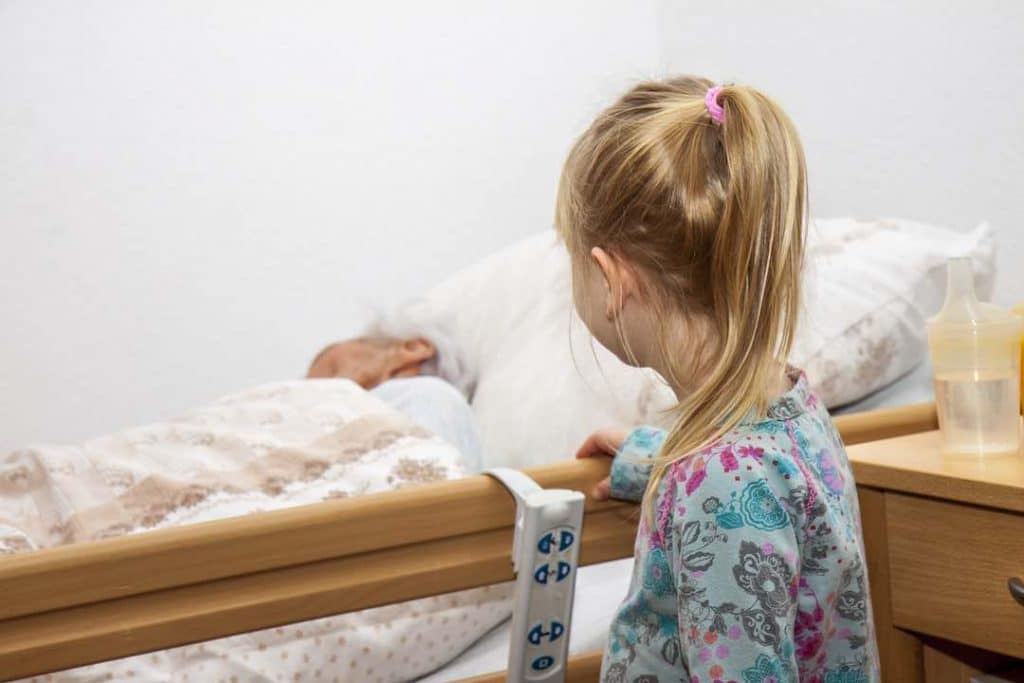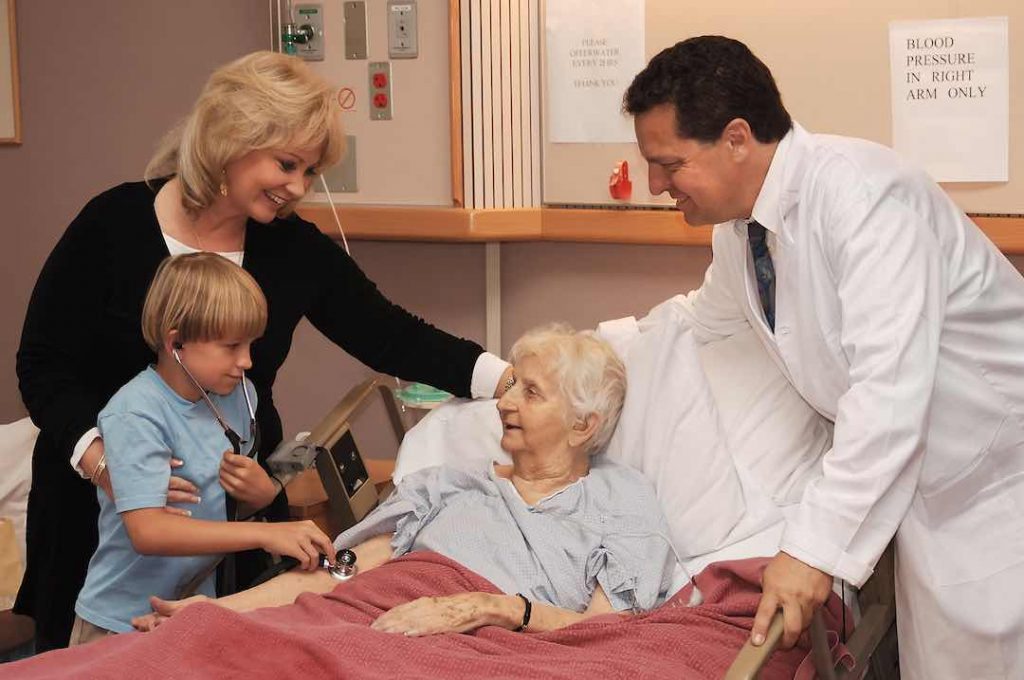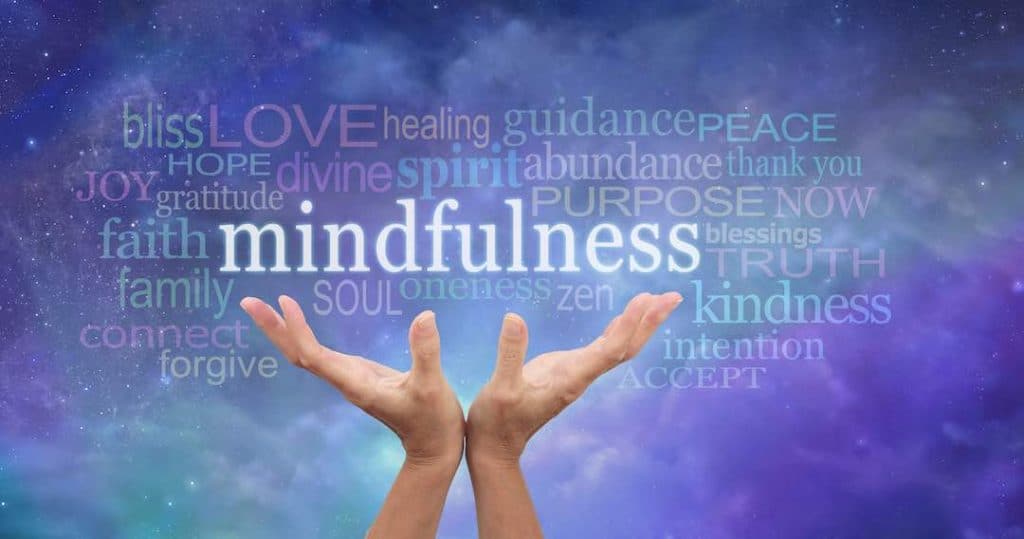
Introduction
It’s never easy to see someone you love dying, let alone knowing what to say when all you feel words that are knots in your throat and searing pain fills your heart in waves. It’s also challenging to not know what not say or even how to behave. You’re not alone. Most people don’t know what to say, or how to behave when they’re around their dying close one or their terminally ill close one.
In this article, we will explore the different circumstances of a dear one dying and some suggestions of what to say, when and how. I’ll also give some tips on what not to say, and how to handle most of the dying days together with your close one. I’ll offer you some concrete communication tools that you can use. These tools can prepare you to know how you can actually BE present with your dear one and have the effect that the dying human being you love and respect so much, is feeling loved and that he/she had an impact on your life in some way.

Society Today
In our society, the majority of our grandparents or parents no longer live with us in our homes, as they did a hundred years ago. So different ways of communicating and dealing with more elderly individuals have not been learned about in a first-hand way in many cases. Communicating and dealing with the more elderly family members has thus become an unnatural experience for many of us. Regardless of age, or any other factor, knowing how to be present, in my experience, is the first key factor in communication that can be applied almost universally.
Feelings of discomfort when we think of someone dear or whom we love who is dying, may hold us back from seeing them because we may not know what to say, or we feel we may make them feel worse if we lose it by breaking down and crying in front of them. The vicious cycle can then ensue that you don’t see them before they die, you may well feel terribly guilty for not having seen them. As you can realize this vicious cycle never ends well. This is why learning some communication tools on how we need to handle such situations will help both in the most loving, kind and respectful manner. It will leave both with a sense of closure that is loving and kind.

Taking Life for Granted?
We usually don’t think about death and dying as we go about the daily routines of our lives. Only when we really get sick where we have to be bed-ridden for a while – even three days sick in bed can feel like forever, are we reminded about the tenderness of life, and the realization of what is really important surfaces in those moments like a neon-lit reality check. Slowly we get over what made us bed-ridden for those few days, and we look forward to resuming the life and living of daily routine. Our healthy ego regains itself as we get dressed, shower, and invigorate ourselves with whatever other “beauty” routine habits.
When Ego Takes the Backseat
When people are dying, however, the ego part is no longer calling the shots. The ego stays in the place of hope – hoping to heal, hoping that some “miracle” is possible for them, yet at the same time allowing their spirit to focus on what can make them feel peaceful and content with what is for them in their current state. However, for family members and friends, that may not be the case – they are fraught with worry, anger, sadness, devastation, frustration of being unable to do anything to reverse the numbered days towards finality. Therefore, it’s easily understandable why many people avoid being around someone who is dying because they are afraid and feel so uncomfortable.
A key concern is how is it possible to overcome this fear and shift our feelings and reactions? We can shift our fears and other feelings by acknowledging them little by little gently in a conscious way to ourselves. Only then can we imagine ourselves in our dear, loved ones’ position, and begin to perceive what we would need to see, hear and feel in those moments. Acutely perceiving the nuances of every moment of being in that position that shifts moment by moment closer to the final seconds, will help us have a knowing of what we would want to hear said to us – or not said. This is how we get the understanding of what Being Present really means in such circumstances.

What do you do or what do you say to someone who is dying or is terminally ill?
BE Present, BE Yourself
We now have a conscious understanding of how to achieve Being Present. When someone is dying or is terminally ill, the most important thing to remember is to consciously engage in Being Present. Being Present is being genuine, and as you allow yourself to sense the nuances of the individual’s moments, means you know how to BE present. This allows your natural feelings of compassion, love, care, and empathy to exude from you in the kindest, gentlest ways. BE yourself, naturally. Being Present is bringing your whole self into the situation and let everything outside of that room go.
It’s About The Dying
This is about the person who is ailing and dying, so focus on giving, giving your love and your listening skills. Bring yourself in an awareness of holding the space for this special someone who needs to be “held” without judgment or pity. This is the best time to allow yourself to give them a sense of your unconditional love and letting that special person know how much you love them.
Just sitting in silence, yet Being Present with sending love is many times strong enough for them to feel it, and be enveloped warmly with it. Love is a pretty strong emotion that can be sensed through a gentle silence that many times speaks louder than words. Even though the person who is dying may be unresponsive, or even unconscious, they can still feel you, and hear you. Hearing is the last sense to go, so allow yourself to say all the loving words that come naturally to you, and let yourself express to them the memory of even a small detail that brought about a significant impact in your life for which you will always be grateful to them. Know that throughout all of this, your conscious awareness translates into the energy YOU exude and thus bring to that person in those moments.

How can you know when someone is dying?
Everyone is different and each will have their own unique way of how their physical existence will come to a close. Some people have a gradual decline and others fade quickly, depending on their particular body/illness.
By Being Present, you are providing comfort and reassurance to your loved one. The soothing words and gentle actions, such as stroking their arm or holding their hand, will help them feel valued, loved with a sense that their dignity is honored and maintained through the comforting warmth of gestures.
Concretely speaking, if hospice has been already called on the scene, then the medical support team has recognized that your loved one most likely has 6 months left of living. This timeline fact helps family and friends accept the way towards their loved ones’ final transition. The time can be viewed as a gift that allows for family and friends to set the intention for making these last days loving, peacefully “healing” ones filled with much love, compassion and respect, dignity and honor that is possible for one to feel.
Physical Signs of Dying
The doctor or nurse in charge can tell you at what stage towards death your loved one is “active” in. This is why it’s also good for you to be aware of some of the physical signs when someone is in the “active” state of dying. This information that the Doctor can share with you will help you understand how to Be Present, and you may also be encouraged to “speak” to your dying loved one because he/she can “still hear you” even though there may be no reaction.
Here are some guidelines that you may find helpful:
1 to 3 Months Before Death
If the time factor is one to three months before death, your loved one may be sleeping or dozing more, eating and drinking less, withdrawing from people and stopping to do things they used to enjoy, and they may even be talking less.
1 to 2 Weeks Before Death
When the person is one to two weeks before death, the person may feel tired and drained all the time and may not even leave their bed. Their sleeping patterns change, have little appetite, fewer and smaller bowel movements, and may be even experiencing more pain. Their blood pressure, breathing and heart rate changes, along with body temperature leaving their skin cool, warm, moist or pale, along with congested breathing that gets to a place, called, “the throat rattle”. Confusion can also set in with hallucinations and visions. This may be caused by having one leg in the physical world and one leg in the spiritual world, seeing long-gone loved ones. There’s nothing to “do” when this happens, but to allow them to have their experience. This is when you really recognize this dying experience is about them, and not about you.
When Death is Within Days or Hours Away
When death is within days or hours away, your loved one may not want food or drink at all. Don’t confuse this with thinking you are starving them and if they only ate or drank, all would be okay. This is not true. The body goes through a sort of labor when it dies. Just think, all the organs in the body have functioned on a certain level for however long it has been. And now the system is shutting down, so every organ impacts all the other organs. Their pulse or heartbeat is irregular or even hard to feel or hear. Their body temperature drops even further. Their skin turns a mottled bluish-purpose (in the last 24 hours) and their breathing is interrupted by gasping slowing down until it stops entirely. If they are not already conscious, your loved one may even drift in and out.
At the end, your loved one may become restless and confused, as we discussed above with hallucinations. They may even cry out or try to climb out of bed. What’s important is that you stay with them, keeping them calm with soothing music and a gentle touch. I have seen in many instances, that medication is used, not only for the pain, but for the comfort level.

How to prepare the environment for someone who is dying.
Setting the tone of the room is important. It can be lit, but not too bright. Make it as peaceful and quiet as possible and constantly assure them that you are there. Maybe even some recorded favorite music playing gently that can be uplifting.
Expect Surprises
Sometimes a loved one will surprise you by becoming suddenly clear-headed. My dad, for example, became an oracle, saying profound statements about his children, grandchildren, and great-grandchildren. I wasn’t even sure it was my dad! Also, don’t be surprised if they “rally” several days before they die. This happens often, where you think they are actually getting better. The day we took my dad home from the hospital, we thought he had but a few days left to live, so we wanted to have him come home to live his final moments. The following day, he was sitting in his wheelchair on the front porch, drinking a cup of coffee. We had a big laugh about it all, thinking he would live another 3 years! It was his rally and 10 days later, he died.
When Death is Near
The doctor and the care team nurse may advise you when death is near so that family members can come near, hold vigil with different things that come in the moment – lit candles, gentle singing, some have said that they could feel the joyful energy of angels surrounding their loved ones in those final moments.
Remember, it’s never “useless” to be there because you might feel that at that stage, they may not even know you’re there. Somehow, and from my experience as a death midwife, I believe they do know, and somehow, they sense without the knowing as we “know”. This may also be the reason that your loved one might wait for everyone to be there to die in peace, or, wait until everyone has left the room to die. Don’t beat yourself up if they died while you were out of the room. It’s important that you find solace just to know that you were supportive and helpful as possible.

“When someone is dying, remember it is not about you.
Hold the space for them. Be present. Be loving. Be supportive!”
– Shelley Whizin
What to Say and NOT to Say is the Question!
Throughout all these stages, there are no “right or wrong” things to say, but when they’ve been diagnosed as terminal, and they are nearing those final stages, accept that he or she will not be getting better. Avoid saying statements that may come from your uncomfortable place such as, “Oh, you’ll be fine”, or, “You’ll get better, hang in there”, or, ”You can beat this,” because in the end they may not be helpful to the dying person at all since they know and feel a finality to their life. It’s harmful to give false hope in those terminal stages.
The value of Being Present, as in holding space for your loved one, is a way of showing them the greatest honor, dignity and regard. We don’t really have to “do” anything but share our love and hold the space for them to feel peacefulness without feeling they are “wrong” or “weak” in dying. Knowing what to say, what to do and how to behave is paramount in making it a peaceful, serene, with the energy of a “goodbye” that is really saying “fare really well” dearest loved one.
Here are some more do’s and don’ts:
- Avoid assuming they know what they need/want/are experiencing. Validate them by expressing your sadness, letting them know you are there for them, no matter what.
- Be specific in asking what you can do for them: ask to clean out something, cook something, bring something or whatever. Make sure you are sincerely loving in your offer.
- Follow through with what you say you’ll do. The person has nothing else to do but lay in bed day in and day out watching the clock with nowhere to go. They look forward and count on you. So if you say you will come back on Tuesday at 2pm, make sure you do!
- Avoid statements that are cliché meaningless, such as, “Well, we all will die someday”. Acknowledge their experience of bravery.
- If you’re a person known for your sense of humor, then don’t change. Dying persons can still enjoy laughter.
- Avoid talking about spiritual beliefs if you are not sure of their beliefs.
- Never say, “I understand,” when they are sharing something, they are experiencing with you, because you don’t understand. You are not the one in the bed dying. THEY are. What you can always say is, “It’s understandable that you would feel that way,” letting them know they have the right to feel the way they feel under the circumstances. Be sincere in your communication. Mean what you say and say what you mean.
- Don’t talk about the weather out of discomfort or about some mundane topic like an episode from a reality show. Make the visit personal. “Read” the person, and be a good listener. Let them share what they want to share, as they may feel they need to come to terms with some things.
- Make eye contact. The eyes are the windows to the soul. Look deeply and you will find their sparkle, even if their physical appearance is not what you’d like it to be to feel comfortable. Everyone wants to feel as if their life mattered, as if they made a difference, as if they were important, impacting other human beings in a positive way. Let them know their life truly matters.
- Be truthful and kind and don’t censor them if they want to talk about their end of life experience or even their funeral arrangements. Listen with an open heart. Let them express what they desire and offer to help if possible. Just knowing that you will share some of the responsibilities is a huge deal and may offer a source of relief.
- Don’t jump in out of nervousness with meaningless statements to fill the time/void. Silence can be your friend if you allow yourself to breathe and focus on sending love. Just knowing you are there is enough for them.
- Ask “How are you holding up?”, but avoid saying, “How are you?”
- Ask permission if it’s okay to talk about their dying experience. I was genuinely curious as to what my dad was going through when he was dying, and I would ask him what he was experiencing, and he wanted to share it. You never know what treasures you will find.
- Learn to hold the space for their experience with honor, dignity and regard. Don’t fill the space with your own grief, but share the love you have, letting them know you will miss them, that they are leaving a huge imprint in your heart.
- You can let your loved one know that you’re not sure what to say, however, you assure them you are there for them as long as they want you to be.
- Stay away from judgment about their health care decisions. My friend, Toni opted for chemo and radiation treatments, and she was the most spiritual person I knew. Many alternative healers came to offer their services, but she only wanted to go the medical route. It doesn’t matter what you think, it’s their choice and it’s up to you to support that choice. This is respecting their decision.
- BE present, can also mean Be quiet and calm.
- Don’t let yourself feel guilty if you don’t want to see them that way. Make peace with yourself and your loved one. If they are still able to read, send them a card or an email or a text. Give them a call and just let them know you love them or go with a group of people, if it helps. Whatever you choose to do, honor your choice, do not judge yourself and send love and healing.
- Don’t say “goodbye”. Maybe you can change that to “Until we meet again,” letting them know they will never be gone from your thoughts and heart.
- Don’t forget to say, “I love you,” or “I forgive you,” or “Please forgive me,” or “Thank you,” when appropriate. Dr. Ira Byock, writes in his book, “The Four Things that Matter Most” that dying people really want to hear those four things. A great healing can take place during this time when you are conscious, for you and for the dying person.
- Don’t wear smells that are overbearing. Be conscious of perfumes, colognes or scents that you use on yourself. Know that people who are dying have a very sensitive smelling mechanism. The sense of smell is the second to last sense to go (the last is hearing, as we stated above), so if you smoke, don’t smoke around them. They can get irritated by the slightest smell.

Conclusion
Leave Fear at the Door
It’s totally understandable that we may feel fear when visiting someone who is dying and get tongue tied or frozen when it comes to know what to say and what not to say. It’s also important to be aware that energy is energy and is carried with us whether we want it to or not. Fear is definitely an energy that can be sensed by someone else. Animals sense fear and they have an instinct to attack. Fear is a palpable emotion, so when we feel fear, the dying person senses our fear and may also go into fear mode, even if not intentionally.
I was taking care of a friend of mine, who was dying. He was an acting teacher who was loved and admired by his many students who wanted to see him. Some were fearful of seeing him, because he wasn’t his “vibrant” and “charismatic” self. Parkinson’s stripped him of all his facial animation, and he could no longer speak. I set up a time for people to visit and asked everyone to leave their fears at the door and assured them that they could pick them up on their way out. I explained that entering the house was now considered sacred ground and needed to be regarded as a reverent space.
When people realized that they could intentionally let go of their fear, even for a while, they felt more peaceful and accepting of the situation. It was a beautiful send-off for this man with more than 200 people visiting. They surrounded him in the hospital bed we set up in the den, and would sing him songs that he had composed, or just surround him in silence with honor, dignity and regard, gently touching his arms, legs and feet. It was quite beautiful.
It’s Not About You
Being Present also means you are in total awareness that it’s about the dying person, not you. As much as is possible within your capacity, begin to find a sense of ease and grace in “allowing” the process to be a sacred experience, celebrating the LIFE of that person, holding space and respect for the entire process of life and death.
The most important thing is allowing the person who is dying to feel a sense of well-being, ease, and as comfortable as possible. Your ability to hold the space with loving energy is just as key as knowing that you played an important supportive role in helping your loved one have the most peaceful healing experience. Make it the most beautiful, conscious and sacred experience you can, even if you don’t say a word. Your presence is the loving gift you bring, and if you are not able to be physically present, send your love through any means possible.
It’s your life. Enjoy the journey. And remember to bring love into everything you do!
https://www.medicalnewstoday.com/articles/320794.php https://irabyock.org/books/the-four-things-that-matter-most/





